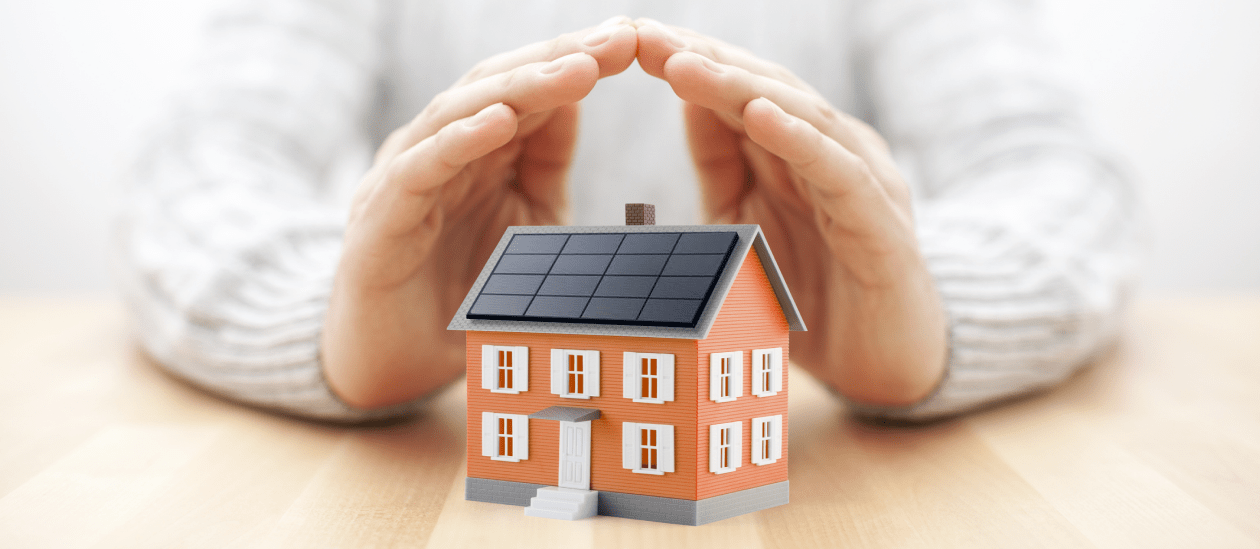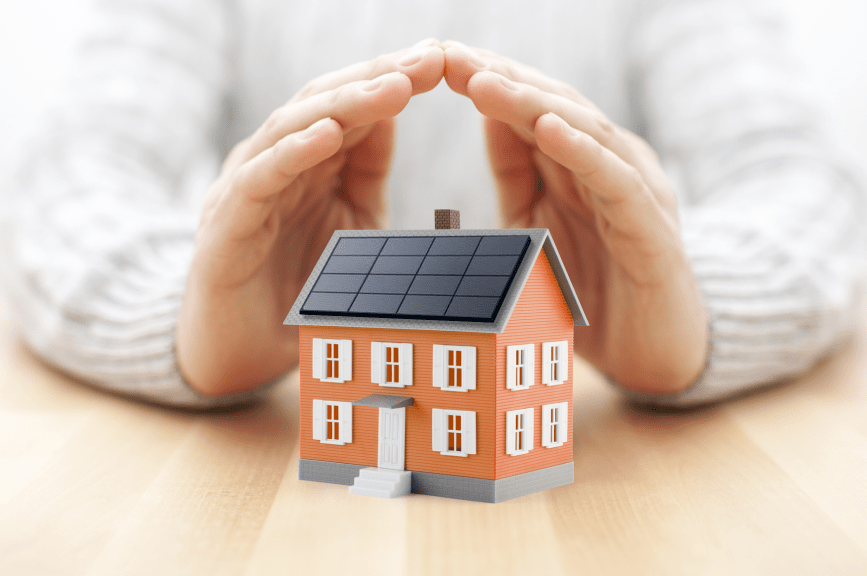

America has reached a new milestone: 5 million solar installations. A vast majority of those (97%) are on residential rooftops, illustrating the overwhelming acceptance of solar as a competitive energy source.
But your roof is the most susceptible part of your home — the first line of defense against roaring winds, flying debris, violent hail and heavy snow. While rooftop solar provides a layer of protection against the elements, the tempered glass covering those photovoltaic (PV) cells is thick, but not indestructible.
As severe weather events prevail, many homeowners wonder, “Will insurance cover solar panels?” The answer is generally yes; most homeowners’ policies offer protection against risks like theft and weather-related damage. However, you may not need to file a claim and pay your deductible. It depends on who your solar provider is and how you finance your system.
Whether you’ve already installed solar or are thinking about joining millions of other Americans and creating clean energy from your rooftop, it’s important to understand the caveats of solar insurance.
Who Owns Your Solar Panels?

If you purchase your system outright with cash or finance with a loan, then you are the system owner. In this scenario, you’ll need to insure your system via your homeowner’s insurance policy. Most policies cover panels that are permanently fixed to your home (a rooftop array), but if you have a ground-mounted system, this could be different. Always talk to your insurance agent about specific protection and coverage limits, meaning the maximum amount your policy will pay toward a covered loss.
If you opt for a lease or power purchase agreement (PPA), then your solar provider owns the system and you either pay a monthly rate (like a car lease) or purchase the energy your system produces. Both arrangements are called third-party ownership and will be insured by the owner: your solar company.
Whether you choose a lease, loan or PPA, all Sunnova solar and solar plus battery systems come with a 25-year Sunnova Protect® Platinum plan. This covers your installation and equipment as well as maintenance, monitoring and repairs. Your level of coverage will vary, depending on the energy plan you choose. This warranty is limited — it won’t cover catastrophic events or damage due to customer behavior — but it does offer peace of mind that your system will meet performance expectations, or we’ll fix it.
Do Solar Panels Increase Home Insurance Premiums?

Installing solar panels on your roof won’t directly increase your insurance premiums. However, you may be required to increase your coverage limits or add protections to your policy to be fully insured — and this can bump up your rates.
Solar panels on your roof or garage usually fall under ‘dwelling coverage,’ which safeguards your home’s physical structure along with any permanent attachments. Your policy’s dwelling coverage should equal the replacement cost of your home. Therefore, if your rooftop system increases your home value, your rates will likely go up when you renew your insurance policy.
What Happens if a Sunnova Solar System is Damaged?

Solar panels are designed to withstand hurricane-force winds, loads of heavy snow and even balls of hail that pelt your roof repeatedly. However, things happen. The wind may launch a tree limb into your southern-facing array or even dislodge a panel from its racking.
If your solar system sustained damage during a storm:

For customer-owned Sunnova systems:
- When you purchase your solar or solar plus battery system through a loan, you own the system. As a homeowner, you’re responsible for filing a claim with your insurance company to get reimbursed for any damage to your roof or solar array.
- Insurance companies are not obligated to use Sunnova technicians to repair your system. However, if a non-Sunnova contractor causes damage to the remainder of your system — or any storage equipment you have hooked up — we will not cover the secondary damage. Therefore, we advise customers to hire Sunnova to ensure the repair is done correctly.
- Sunnova won’t work directly with your insurance provider, so homeowners are responsible for coordinating the payout and repair work. Any damage disputes must be reconciled between the homeowner and the insurance company.
For Sunnova-owned systems:
- When your solar or solar plus battery system is owned by Sunnova through a Lease or PPA, Sunnova insures the system. If a storm or other event damages your equipment, we are responsible for repairing or replacing any or all components.
- Sunnova contracts include a force majeure clause that may delay repairs, should an ‘unforeseen and uncontrollable event’ occur (natural disasters, infrastructure failures, pandemics, civil unrest, etc.). But we will still fix the damage as soon as it’s safe to do so.
- Our team is responsible for evaluating your damage, ordering replacement parts, installing the hardware and testing your system to ensure everything works properly.


For systems not purchased through Sunnova:
- If you didn’t purchase your system from us, you can still get one-time repairs for any damaged or inoperable system through Sunnova Repair Services®.
- Our certified technicians can repair almost any solar panels, solar plus battery system, add-on battery or Level 2 EV charger.
- Each repair comes with a 12-month workmanship warranty by our specially trained solar technicians.
Does Insurance Cover Solar Panel Removal and Reinstallation?

If your roof sustained damage, Sunnova offers Solar Panel Removal & Reinstallation to quickly dismantle your modules, racking, mounting hardware and wiring in a single day. That way, a roofing company can fix or replace your roof, and Sunnova can reinstall your solar array. No matter where you purchased your solar system, our technical experts will ensure your panels are reinstalled and rewired properly so that your contract and warranty remain intact.
If you have a lease or PPA and both your solar equipment and roof were damaged in a storm, Sunnova will repair your solar array (since your system is insured through us), and your insurance company will cover the roof repair.
If you have a loan or only your roof was damaged — say a hailstorm cracked shingles not protected by your panels — your insurance should cover the solar removal and replacement for both Sunnova-owned and customer-owned systems.
Solar Panel Insurance Coverage: Types of Losses
What are the most common causes of solar equipment losses? Researchers at the National Renewable Energy Laboratory (NREL) conducted a six-year study, examining physical damage and liability for solar losses. Published in 2020, the study revealed:*
- The leading causes were hail (53%), wind (32%) and fire (8%)
- Other causes include lightning, flooding, theft/vandalism and freeze (snow and ice)
- The average residential claim was just over $79,000
- Colorado & Texas had the largest concentration of hail-related losses
- Florida had the highest wind-related losses and California had the most fire-and-lightning-related claims
While wind and hail represented the largest number of claims, the losses were generally modest — cracked and broken panels. Fires led to total losses, which are rare but carry a higher price tag.

Understand How Your System is Insured
No matter where you live, a natural phenomenon can take your solar system offline. From rural areas to metropolises, disaster can strike anytime, as we saw when Hurricane Beryl pummeled Sunnova’s Houston headquarters.
By understanding how your solar system is insured, you’ll be ready when the next storm hits. You can’t prevent a catastrophe, but with the right preparation, you can reduce its impact.
Don’t have solar yet? Have solar and need a repair or removal?

